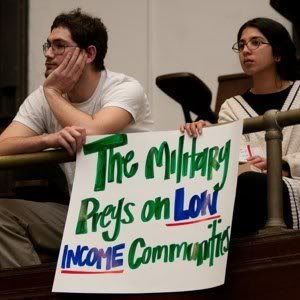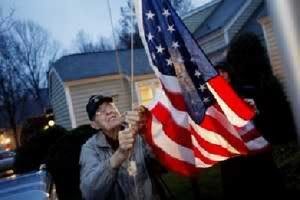That's what it seems I'm doing.
First, there's that Westboro church that protests at military funerals, saying it's God's punishment for American tolerance of homosexuality. If you've got access to my father's Facebook page, you can see his ... uh ... rather strong opinions on that matter.
They don't really bother me that much, though, because they're clearly in the wrong. Showing up at a funeral, uninvited, is just plain bad manners. They should be permitted their message, but not at the expense of a grieving family.
 Then there are the folks opposing the reintroduction of ROTC programs at universities like Columbia University.
Then there are the folks opposing the reintroduction of ROTC programs at universities like Columbia University.Columbia banned ROTC 42 years ago, during the peak years of the Vietnam War, but continued the ban even after the Vietnam War and the draft ended. More recently, opposition centered on the military ban on open homosexuality -- liberal groups on campus were able to maintain the status quo as a standing protest of the more conservative military policy.
Yet even now that DADT has been repealed, some groups still fight its reintroduction. According to the February 23 Stars and Stripes (the only newspaper we get here), former Army sergeant and Purple Heart recipient Antony Maschek was heckled as he advocated its return.
As cited in the New York Post on February 20, some students shouted "Rascist!" and held placards with such messages as "The military preys on low income communities" and "1 in 3 female soldiers experiences sexual assault in the military."
And as Sociology Professor Emeritus Herbert Gans told The Post, "Universities should not be involved in military activities .... Columbia should come out against spending $300 billion a year on unnecessary wars."
That stuff bothered me.
It's fine to oppose the military's policies. It's healthy to criticize its failures in handling sexual assault cases. And I definitely approve of a healthy debate about the necessity of a war (I just wish we'd had more of that in 2003). But the ad hominem attack was simply irrational -- unhelpful to the debate.
More tellingly, though, was the professor's comment about the university's involvement in military activities. That kind of Vietnam Era thinking suprised me -- he would rather limit a student's right to choose than permit the presence of a philosophy he opposed.
I don't understand this kind of thinking. The Army hasn't drafted anyone since 1973, corporal punishment is not tolerated, and with the GI Bills, the military does more to get minorities into college than any civilian institution.
In fact, I think ROTC has more in common with a college football team than the Army of 40 years ago. Students volunteer to participate, do physical exercise to train, attend training camps, receive scholarships, and hope for a related job after graduation. It's true that ROTC has some restrictions based on physical characteristics, but is rejection for transgender status really any different than being cut from a team because of physical stature?
To continue the comparison, why are sports teams not accused of exploiting low income communities? The lower classes of society are lured by the offer of money to risk threat of serious and life-long injury. And minorities comprise a greater percentage of professional teams than the population at large -- does that make them rascist?
 Lastly, I take issue with veteran Van T. Barfoot, the 90 year-old who wanted to have a flagpole in his front yard despite his housing association's rules. He wasn't content with the existing rule that permitted flying the flag from a house-mounted bracket, so he disregarded the rules and put one up anyway.
Lastly, I take issue with veteran Van T. Barfoot, the 90 year-old who wanted to have a flagpole in his front yard despite his housing association's rules. He wasn't content with the existing rule that permitted flying the flag from a house-mounted bracket, so he disregarded the rules and put one up anyway.The housing association threatened legal action, but then backed down in the face of the national controversy and let the veteran have his way.
This guy bothered me, too. Yes, he's a hero. He served in World War II, Korea, and Vietnam, and he earned a Medal of Honor for unparalleled valor.
But he let the media use his service record to turn a clear violation of rules into a "veteran's free speech" matter. Just because we're veteran's doesn't give us the right to pick and choose the rules we're going to follow. This wasn't a matter of free speech -- he could have flown his flag in the manner prescribed. He just wanted to do his own thing; if anything, that's poor discipline.
To the retired colonel, I say (and I'd say it respectfully), "Sir, that's not cool."

No comments:
Post a Comment